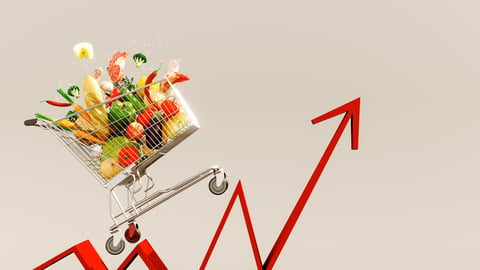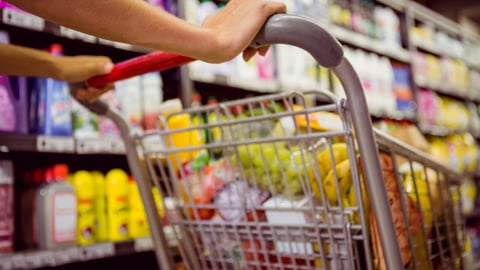Calls for grocers to 'freeze' food prices misinformed: OPINION
Recently in Canadian Grocer and other publications, Sylvain Charlebois, director of Dalhousie’s Agri-Food Lab, called on Canada’s grocers to freeze prices, which reminded me of the adage that “misinformation can get halfway around the world before the truth has a chance to get its pants on.”
The call for a price freeze from Charlebois, the NDP and some other armchair observers stems from the misconception that there is “greedflation” taking place within the Canadian grocery sector. Curiously, it was Mr. Charlebois’s own Agri-Food Lab study, released in August, that discounted “greedflation” in the food industry, pointing out that “It may look counterintuitive, but the numbers are not pointing to commercial abuse towards consumers.” Indeed, grocers are no more to blame for rising prices and inflation any more than myriad businesses and institutions, which includes food suppliers, trucking and rail companies and yes, even universities such as Dalhousie.
At the latter, for example, notwithstanding the financial stress on students, Mr. Charlebois’s own university increased tuition costs by another 3% this year, which it has done annually for the last 10 years. In justifying yet another tuition hike, the university argued that costs were increasing mostly “due to compensation increases required by collective agreements (salaries, benefits and pension payments) for the faculty/staff… which makes up nearly 75% of the budget.” But I have not read of anyone accusing Dalhousie of “greedtuition.” Yet the factors driving up the pressure of costs on Dalhousie are largely internal and, arguably, within its control. Conversely, cost pressures impacting the food sector are not.
There are approximately 6,900 independent grocers in Canada, who operate on overall margins of 1.5% to 2%. Cast those margins within the context of the issues driving up food costs for both retailers and suppliers and one realizes how absurd it is to issue a call for grocers to freeze prices. The food industry has been reeling from skyrocketing fuel costs and surcharges; climate catastrophes such as flooding in B.C. and a drought in Western Canada; the ravages of COVID and its impact on labour; shortages in raw materials and packaging; port, rail and border disruptions; and of course, the Russian invasion of the Ukraine. Some would be forgiven for thinking the four horsemen of the apocalypse had galloped through the food industry.
Those realities are why Mr. Charlebois’s own aforementioned study pointed out that while “Indeed, revenues have increased dramatically, so have the costs of goods sold.” Therefore, a corollary of grocers freezing prices has to mean that a widespread freeze would need to be imposed on just about every sector of the economy – the oil sector, rail and transportation companies, food manufacturers – to somehow bring about a stop to the impact of climate change and the war in the Ukraine.
Incidentally, since Mr. Charlebois also expressed concerns about credit card purchases for groceries, he should be reminded that another cost invisible to consumers – that of high credit card interchange fees – are paid by the grocer on each and every customer transaction using a credit card. Juxtapose just those fees alone, which amount to an estimated $10 billion annually in Canada, within the margins of grocers.
Those slim margins by necessity govern what a grocer must do to remain in business.
While Charlebois says he hopes “that one grocer will come out with a bold strategy like freezing prices on certain key staples,” even in the supply managed sectors of essential staples, this year egg prices have increased by close to 16% and milk prices by 10.9%. Those are the regulated increases, and do not account for additional costs layered on by the processors.
In August, the same month the Dalhousie Agri-Food Lab released its report, grocers were being told by one large supplier that bread prices were going up this fall by another 6%. So by what business model could a grocer possibly entertain the thought of freezing prices?
For independent grocers, who have a symbiotic relationship with the communities they serve, higher prices are a shared concern with their customers. In many of those communities, where an independent may be the only accessible grocery store, the issue of food security is also very much predicated on the ability of that independent to supply their community at relatively affordable prices.
But neither grocers nor suppliers are the culprits for rising food prices in Canada or other countries, such as the United States, UK and Germany, where food inflation is even higher than it is here.
Food industry stakeholders, from gate to plate, have a shared commitment to making the industry one that continues to look for ways to better serve Canadians. That is why constructive industry led discussions are taking place to develop a Grocery Code of Conduct. Those stakeholders know that our challenges can sometimes be complex in a very interdependent, interconnected and unique Canadian food industry. We need thoughtful and fact-based conversations on addressing those challenges, particularly those related to food prices.
A simplistic call to have grocers “freeze prices” should not be a substitute for informed discourse. The role of academic institutions such as Dalhousie should be to help inform understanding, not inflame misunderstanding. That does not serve the best interests of the food industry nor the Canadian consumer.
Gary Sands is the senior vice president of the Canadian Federation of Independent Grocers



